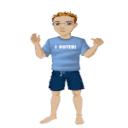Yahoo Answers is shutting down on May 4th, 2021 (Eastern Time) and beginning April 20th, 2021 (Eastern Time) the Yahoo Answers website will be in read-only mode. There will be no changes to other Yahoo properties or services, or your Yahoo account. You can find more information about the Yahoo Answers shutdown and how to download your data on this help page.
Trending News
Career / hobby question?
i want to be able to design and make my very own circuits and write programs for them (not really for sale, much like a hobby),
i wanted to study electrical/electronic or computer engineering, but ended up studying Information Technology....so my question is....
is there a way i can achieve that knowledge without
1. spending 5yrs doing a second degree
2. doing that in my masters
3. going to MIT (obvious)
i mean, u know, something like a 1 year course, or some private institution like NIIT, i just want to be good at building my own chips....any ideas???
and i dont think self education will be a good idea for me....i need a live instructor or something
4 Answers
- Mark MLv 71 decade agoFavorite Answer
First, a second degree is easier than your first, you already have all the electives. Second, circuits is all about the math. If you have taken all the math that a Electrical Engineer has to take, you can finish off your second degree in two years. That is how long it takes a full time student to complete the linear, and non linear circuit design, and basic and digital control theory.
So if you are still interested, start taking evening courses at a local engineering school. Even Devry has a Bachelors of Engineering Technology that is more hands on and less theory. However if you really want to work in IC circuit design, you should go for your Masters in Electrical Engineering.
Source(s): BSEE - Anonymous5 years ago
For me, photography is a paid hobby. What do I mean by that? I mean that I do it as a hobby because I like to do it... but I leverage myself in a way that will allow me to get paid for it. (i.e. corporate events, portraits, stock photos etc). There are a ton of different areas that you can make decent money as a photographer even if you just want to do it as a hobby. My main objective when i shoot, is to have fun.... Once it becomes a J.O.B. I start to lose interest and have less fun... so, it stays a hobby. But I do make money with it.... quite a bit actually. You might be interested in my blog (link below). It's designed for hobbyists that want to make money as photographers but don't know how to get started with marketing themselves. When you take on photography as a career, there is more to it than just taking pictures. You also have to be a savvy business person, and a great marketer.
- 1 decade ago
The Masters of Science program in Computer Science provides intensive preparation in the concepts and techniques related to the design, programming and application of computing systems. The program requires students to take a broad spectrum of courses, while simultaneously allowing for emphasis in desired areas of specialization. The program is based on HEC guidelines. The program comprises one-year of study over at least 3 semesters. It requires completion of 30 credit hours of course work. Students take 8 courses and a thesis of 6 credit hours equivalent of 2 courses in order to complete their degree requirements. Students must maintain a 3.0 CGPA for conferment of degree.
Eligibility
BS(CS) / MCS / BE in Computer Engineering OR
16 Years science and engineering graduates. They have to cover deficiency as proposed by the Department Board of Studies
Minimum CGPA of 2.5 on a scale of 4.
MS (Computer Science) program consists of two groups of courses: core and elective.
Core Courses
CSC 541 Advanced Research Methodology
CSC 543 Advanced Computer Architecture
CSC 545 Decision Theory
CSC 547
Analysis of Algorithms
Elective Courses
CSC 531 Data Warehousing
CSC 561 Advanced Software Engineering
CSC 562 Object Oriented Software Engineering
CSC 563 Software Quality Assurance
CSC 564 Software Requirement Engineering
CSC 565 Software Testing Strategies
CSC 571 Advanced Database Management Systems
CSC 573 Data Mining
CSC 574 Distributed Systems
CSC 575 Parallel & Distributed Computing
CSC 576 Parallel & Distributed Algorithms
CSC 578 Communication and Information Policy
CSC 581 Neural Networks
CSC 582 Pattern Recognition
CSC 583
Fuzzy Systems
Course Structure
SEMESTER ONE SEMESTER TWO
Adv. Research Methodology Decision Theory
Adv. Computer Architecture Elective I
Analysis of Algorithm Elective II
SEMESTER THREE
Elective III
Elective IV
MS Thesis (6 credit hours)
This may help you!!!!!!!!!!!!!!!!!!!!!!!!!!!!!!!!!!!!!!!!!!!!!!!!!!!!!!!
- 1 decade ago






